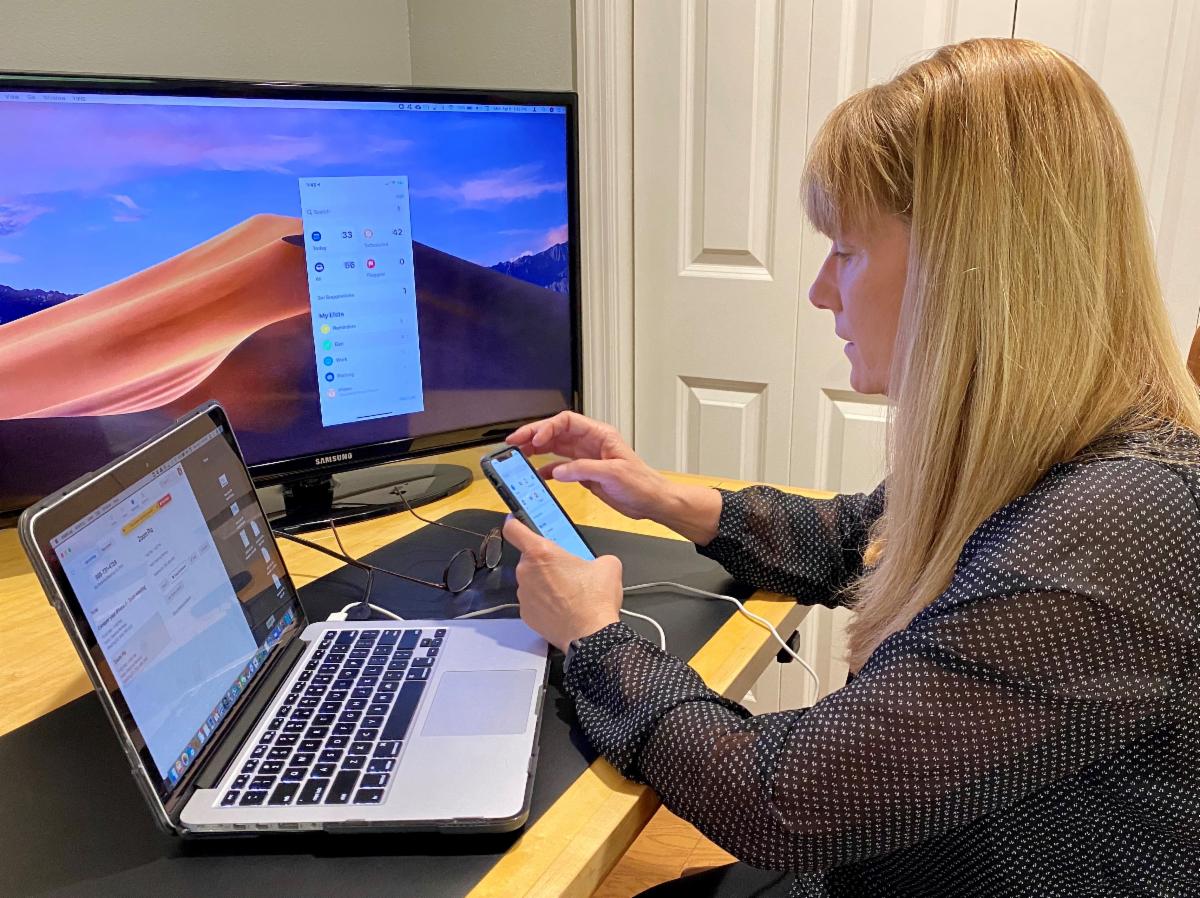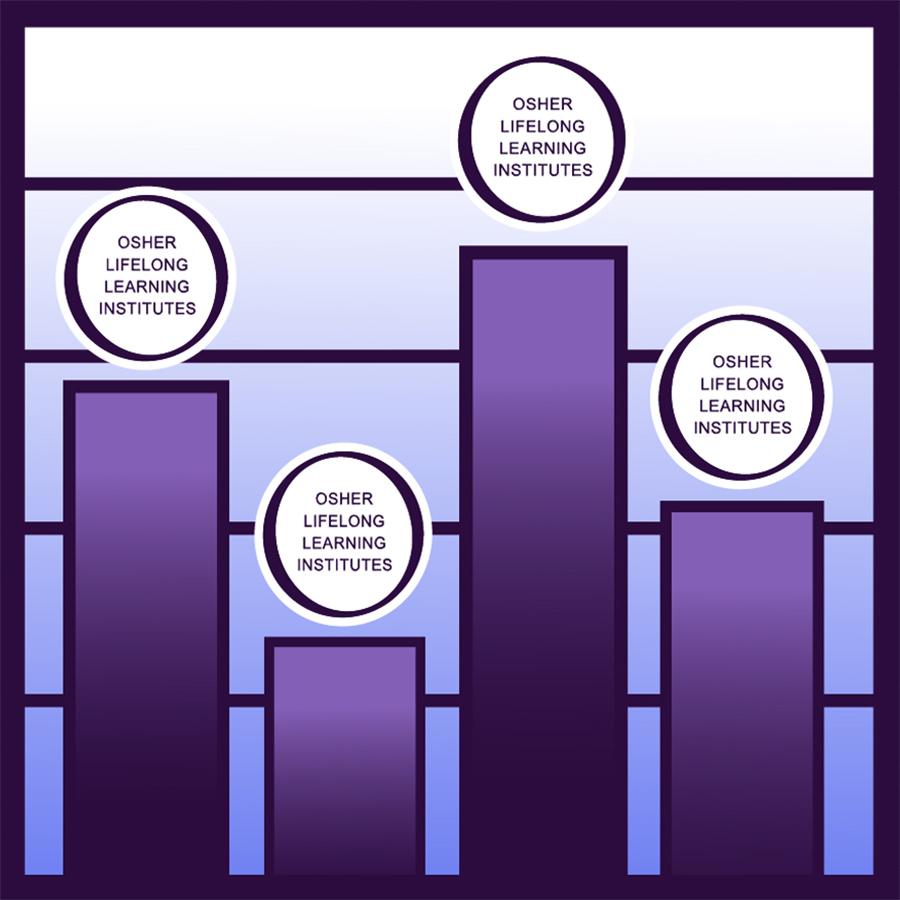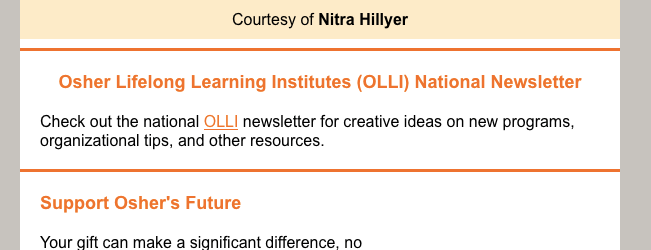|
|
|
|
|
|
|
Greetings from the NRC May 2020
15
|
As we enter another month of remote OLLI operation, let me point out that for most Institutes, physical distancing is very different than social distancing. Online courses, social activities, committee meetings, and even distance volunteering are growing exponentially at Osher Institutes. This brings to mind a quote my late Dad used: "Champions adjust." He credited the saying to a hero of his who also happened to be a colleague - Billie Jean King. It reminds me of the Osher Network, where we are full of champions in learning and in service.
It's fitting that as National Volunteer Month concludes, our May newsletter features two volunteer projects undertaken by OLLI members benefiting their larger communities. Another article features the success of one OLLI in rapidly converting their offerings to online delivery. Their success is mirrored in other Institutes from coast to coast. OLLI members are learning and adapting rapidly to distance learning technologies. While hardly the ideal for our in-person camaraderie, we are learning there are other benefits to these formats which might aid us in the future. Think about those who are home-bound, travelers, caregivers, or those avoiding winter storms. I suspect the lessons we learn and teach one another during this pandemic will make us stronger Institutes capable of serving even more learning needs in our communities.
Finally, the NRC's most recent survey of Osher directors reveals that 92% of Institutes are utilizing Zoom as their primary platform for videoconferencing. That service is followed by 7% using WebEx; 3% using GoToWebinar/Meeting; 3% using Skype; and 2% using no videoconferencing at this time. (Some OLLIs use multiple platforms if you human calculators have furrowed brows right now.) We expect those technologies are getting a good workout from Osher members and encourage you to play around and learn one or more of them if you haven't already become experts.
As most of us continue learning, socializing, and serving from our home computers, pads and phones this month, let us all consider ourselves OLLI champions - because champions adjust.
Wishing you good health and safety,

Steve Thaxton, Executive Director

|
|
|
|

|
OLLI at University of North Carolina at Asheville
|
 |
|
 |
Suseela Steers, Manna Coordinator and Community Health Worker |
While the current Covid-19 pandemic has disrupted many aspects of life for people worldwide, a faithful group of volunteers from OLLI at UNC Asheville has continued their commitment to support the residents of Asheville Terrace Apartments (ATA) in a twice-monthly food distribution program. Manna FoodBank, a hunger relief organization for 16 counties in Western North Carolina, provides much of the food. Trader Joe's has also joined the effort, donating meat, salads, eggs and bread for those in need at the 248-unit affordable housing project.
Some 175 nutritionally at risk residents participate in the "Manna Monday" program. Prior to the pandemic, many went to the ATA community room to choose food from a selection displayed by the volunteers. Volunteers also delivered filled grocery sacks to rooms of about 30 residents unable to attend in person. Social distancing has limited that ability to self-select, and of interaction between volunteers and residents. Today volunteers fill bags and one at a time, residents are called to get the filled bags. For others, a volunteer knocks on the resident's door to let them know the food is there.
Though the social interaction enjoyed between residents and OLLI volunteers is eliminated for now, the nutritious lifeline continues uninterrupted. Resident Barbara Henderson says, "The food I get from Manna helps stretch my grocery budget through the whole month. I get more than I can afford in the grocery store."
Thirty OLLI members are volunteers. Their corps has shrunk from the eight who previously went at any one time to about three, since many members are in the vulnerable 65+ age group. Some who can no longer attend in person have made monetary donations.
Volunteer Kathleen Mainardi speaks of the friendships she has made, saying, "This feeds my soul." She has high praise for Suseela Steers, Manna Coordinator and Community Health Worker, and John Staatz, OLLI team lead for the project, saying, "They really make the food pantry work." Prior to his retirement, John 's work on the faculty of Michigan State University centered on food security issues in developing countries. As a volunteer, he continues his commitment to see that people in need get fed.
Susueela voices her appreciation for the OLLI volunteers, "The ongoing support of OLLI members has been instrumental in keeping this program available to our residents."
Submitted by
: Judy LaMée, Volunteer Leader, OLLI at UNC Asheville
|
OLLI at Florida State University
Lifelong Learners Thrive as Distance Education Replaces In-Person Classes
|
 While traditional students of higher education, the majority of them "digital natives," adjust to online learning, non-traditional students and lifelong learners are adjusting to distance learning technologies. While traditional students of higher education, the majority of them "digital natives," adjust to online learning, non-traditional students and lifelong learners are adjusting to distance learning technologies.
When the pandemic forced the university to cancel in-person meetings and classes and continue virtually, the 1200 members of the Osher Lifelong Learning Institute at Florida State University were enrolled in over 50 in-person classes covering a wide range of topics and learning environments. For the most part, instructors (many of them faculty members at local educational institutions) had to learn new technology and figure out ways to present materials intended for in-person classes.
 |
|
 |
Jonathan Dennis leading an OLLI Class |
Of all OLLI's Spring Semester classes, the pandemic may have affected Jonathan Dennis and his class on The Human Biome most significantly. Dennis, Professor for Cancer Research in FSU's Department of Biological Science, changed the topic of his class to include up-to-date information on COVID-19 findings. Dennis explained that, "
The transition to distance learning intimidated me, for both technological and social reasons. All of my worries were unfounded, as the transition of the OLLI class to the Zoom videoconference platform was the easiest of all. The ease of this transition reflects the qualities of the OLLI student, that I have come to appreciate over the past few years: always willing to push harder, try something new, make the unfamiliar work, maintain an even-keeled thoughtful response."
With the conclusion of OLLI's Spring Semester, plans are moving ahead for the organization's 3-week Maymester. All classes
will be held remotely. According to OLLI Executive Director Debra Herman, "[FSU OLLI] had already been considering offering distance-education opportunities to our curriculum, but the COVID-19 pandemic pushed us to figure out how we could make it happen. And, thanks to cooperative, innovative instructors and accepting students, we did just that. We hope that we will be able to add new technology to our FSU facilities to make online learning even more convenient."
Submitted by: Debra Herman, Executive Director, OLLI at Florida State University
|
OLLI at Auburn University
Rising to a Community in Need
|
 |
|
 |
Professor Emerita and OLLI Member Margaret Craig-Schmidt Sews Masks |
The urgent need for protective face masks across east Alabama sparked ingenious and skilled action by the Osher Institute at Auburn University. OLLI member's sewing machines are roaring to produce specifically designed fabric masks to meet those needs. An ambitious goal of 10,000 completed masks is underway, with OLLI taking the lead, enlisting friends, religious and volunteer groups, and Auburn University scientific, medical, and engineering colleagues in the process. Completed masks will be made available to local clinics and community health providers at OLLI's landmark Sunny Slope offices as the distribution point.
"OLLI at Auburn has a dedicated and talented base of members who are eager to help during this public health crisis," said organizer Scott Bishop, director of OLLI at Auburn. "Where we saw a need was to provide support to these individual efforts with some collective assistance, and thus help ramp up the production of personal protective masks at this time of great need."
A coordinated coalition of help is proving critical to meet the bold quantity goal of masks. Auburn University Outreach, the division OLLI falls under, helped enlist units across campus, including the Auburn University Medical Clinic, Media Production Group and faculty from the Department of Industrial and Graphic Design and Department of Curriculum and Teaching. Medical Clinic Director Fred Kam advised on the design and applications for the masks; Science and Engineering Education Professor Christine Schnittka created prototypes and designed an instructional plan; Industrial Design Department Head Clark Lundell provided laser-cut fabrication templates and Media Production Group Director Bruce Kuerten produced an online video demonstration featuring sewing instructions.
Generous funding from the Auburn University Foundation is providing $20,000 to purchase materials to produce the masks.
Submitted b
y: Scott Bishop, Director, OLLI at Auburn University
|

Osher NRC Special 2020 Webinar
|
Mark your calendar for an upcoming webinar on Wednesday, May 20th beginning at 2pm Eastern/1pm Central/noon Mountain/11am Pacific/10am in Alaska and 9am in Hawaii. Register Online Here.
 Osher Lifelong Learning Institute and Member Benchmarking Data Osher Lifelong Learning Institute and Member Benchmarking Data
The National Resource Center for Osher Lifelong Learning Institutes (NRC) has conducted a variety of surveys of both Osher Institutes and their membership to create benchmarks of operational data. The NRC will review this data and offer insights on the research findings including membership demographics, distance learning, volunteer committee structures, and more.
Presenters
Steve Thaxton
Executive Director, Osher NRC
Stacey Rivera
Manager of Operations, Osher NRC
Kevin Connaughton
Manager of Adult Learning, Osher NRC
|
|
Do you know?
|
As you might suspect, the distance learning landscape has drastically changed among Osher Institutes over the past few months. In May of 2019, the Distance Learning Committee, a committee formed by the NRC to examine and research distance learning across the network, issued a survey to institute directors. The survey provided data on how many Institutes were offering distance learning as part of its programming. Recently, the NRC surveyed the Institutes seeking the same data. Although the questions were different, a conclusion can be drawn from the results. Here is a comparison of almost a year ago, to today:
From the Distance Learning Survey, May 2019:
From the Distance Learning Platform Survey, April 2020:
In conclusion, in May 2019, almost 20% of responding Institutes were offering a form of distance learning. As of March 2020, as signified by the none category, a little over 98% of Institutes are offering a form of distance learning.
|
An Advice Column for Osher Institute Staff and Volunteers
 Dear Olli Dear Olli
|
 Dear Olli,
I'm a director trying to figure out the best method for hosting files online. Like many other Institutes, we are putting a lot of files and media online for our members to use or download. However, I am struggling with the most effective way to distribute this content. Sending things via email has its limitations. Any suggestions?
~Storage Space Filling Up Fast!
Dear Storage Space Filling Up Fast,
Using just email to share files and media can be difficult, but good news, there are multiple options for file storage and sharing beyond your email or hard drive. There are several free online storage sites. The two most popular are
Dropbox and
Google Drive. Both sites offer similar features, but most importantly, you can share content with members via these sites. Additionally, you can set the files to be secured (no editing allowed), allow only certain people to access the files (via email addresses), and send file specific links with one click access. Dropbox offers 2 GBs of space for free accounts, Google Drive offers 15 GBs.
If you are wanting to share videos without the hassle of those large file sizes and downloads, you can always host the content on a video streaming site, and there are numerous options here as well. Again, I'll just focus on the top two:
YouTube and
Vimeo. As with the previous examples, the sites offer similar features. The most important being password protection for videos, having your videos be private (not to be seen listed by the general public), link sharing, and of course ease of use (just click to play). They each have upload limits or file size limitations with free accounts. Happy sharing!
~Olli
Have a question for Olli? Please send it in care of Kevin Connaughton (kevin.connaughton@northwestern.edu).
|
Quick Tips for Helping Operate an Osher Institute
 Quick Tip - Links to Osher NRC Newsletters Quick Tip - Links to Osher NRC Newsletters
|
 The Osher NRC received many requests to reprint or use the article on resources for the mind body and spirit featured in the April Osher NRC newsletter. We are always happy to have our newsletters shared (an example is shown here from OLLI at RIT's recent newsletter) and you can
visit our website here for direct links to all past issues.
|
Quick Tips for Helping Operate an Osher Institute
 Quick Tip - Keeping Humor in Tough Times Quick Tip - Keeping Humor in Tough Times
|
The Osher Lifelong Learning Institute at Furman University had a bit of fun with their April 1st newsletter. We enjoyed it so much, we wanted to share the April 2020 edition of
OLLILife with you all. Big thanks to Editor, Sue Renault and her team.
|
|
|
|
| |
|